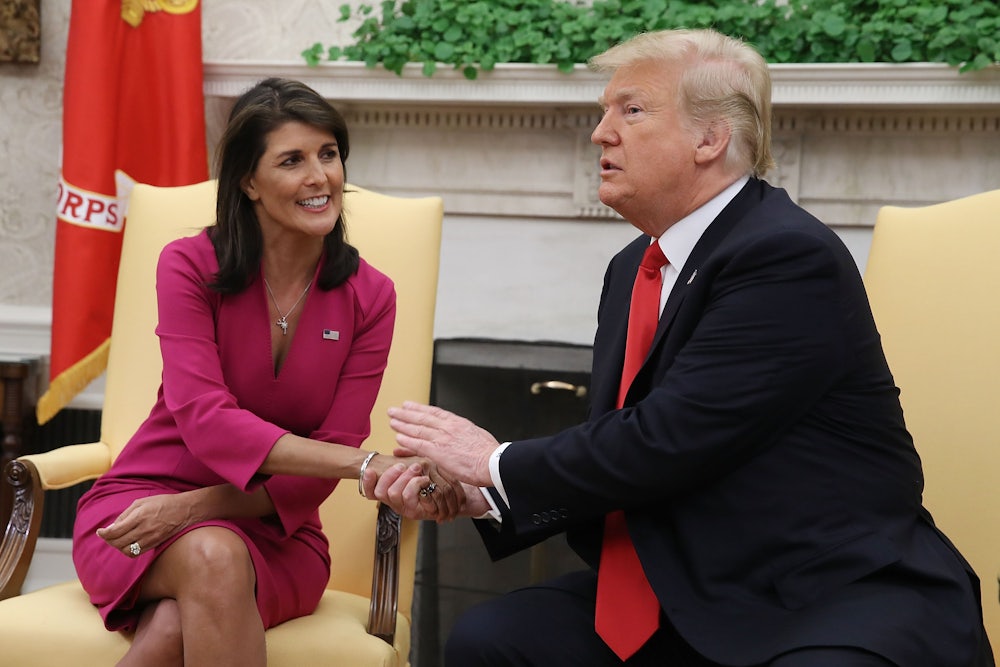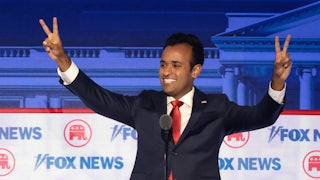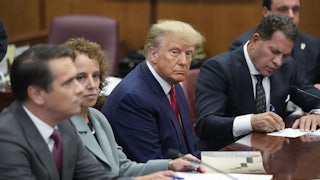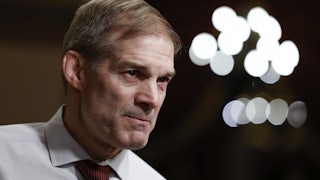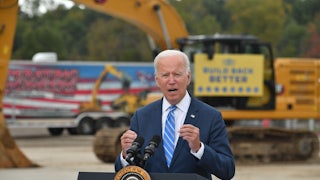“They’re just running for vice president.”
That may be the most common put-down of the White House dreamers who are languishing in the pre-primary polls. The sneering line has beguiled magazine headline writers practically since the moment the race began: “Nikki Haley Is Taking on Trump 2024 (or Running for VP)” was New York’s February 1 headline after the former South Carolina governor announced her candidacy. Donald Trump’s boycott of the opening-gun GOP debate in late August prompted USA Today to frame its preview story around this premise: “Is the first Republican debate just an audition to be Trump’s running mate?” Trump himself has reveled in the notion that his Republican rivals are motivated by nothing more than the dream of being his second banana during a MAGA restoration. During a post-debate interview with Glenn Beck, Trump tentatively blessed the sycophantic Vivek Ramaswamy as a would-be veep: “I tell you I think he’d be very good.”
There is just one problem with this running-for-vice-president trope: It’s ludicrous. There are much simpler ways of snagging a spot on a national ticket than campaigning for president in the long-shot hopes of being rewarded with a consolation prize. In truth, the only person who has ever explicitly run for vice president was a well-born and lightly regarded former governor of Massachusetts named Chub Peabody who campaigned for the heartbeat-away job in the 1972 Democratic primaries. Peabody campaigned for the slot with the quippy motto “Endicott Peabody, the number one man for the number two job.” Even though George McGovern was desperate for a running mate after Tom Eagleton was dropped from the ticket, Peabody’s offbeat ambitions were never taken seriously. Despite his slogan, he ultimately finished fourth in the balloting, garnering fewer than 4 percent of the votes at the convention.
Historically the best route to a vice presidential nomination has been to be rumored as a potential presidential candidate—and then wisely not run. Minnesota Senator Walter Mondale, who pioneered this reluctant-dragon gambit, declared in 1974 that he wouldn’t seek the presidency because “I don’t want to spend the next two years in Holiday Inns.” Two years later, Mondale was staying in a better class of hotel as Jimmy Carter’s running mate. In similar fashion, Al Gore, who ran for president as a young senator in 1988, cautiously ducked the 1992 campaign. His reward: eight years as Bill Clinton’s vice president—and then in 2000 a hanging chad away from the presidency.
The pattern is even more pronounced on the Republican side. Mike Pence is the perfect embodiment of an almost-candidate being anointed after sitting out the primaries. Pence, then the Indiana governor, could have been a leading social conservative contender in 2016 but took himself out of the scrum in May 2015. (Just over a year later, he took the V.P. slot partly to avoid what was likely to be a grueling reelection effort.) Paul Ryan, before he became House speaker, was viewed as a potentially formidable 2012 candidate for the GOP nomination, but instead chose to stay in the House. The result: Mitt Romney named him as his running mate. In 1996, Republican nominee Bob Dole needed to mollify supply-side conservatives with his veep pick. So Dole chose Jack Kemp, the original supply-sider, who had run for president in 1988 but ducked the 1996 race.
If Trump is again the Republican nominee, the V.P. slot may not be worth (in the bowdlerized words of former Vice President John Nance Garner) “a pitcher of warm spit.” Unless you like the look of angry mobs with nooses, serving as second banana to Trump has its career downsides, as Pence illustrates. But when it comes to picking a V.P. before the Republican convention next July, South Dakota Governor Kristi Noem will be high on the list of contenders. As Politico put it Friday, “If the 2024 primary is in part a tryout to be former President Donald Trump’s next running mate, Noem’s national standing appears to have been rekindled. She’s suddenly front-and-center in the veepstakes.” Noem’s secret: She’s not running for president. Virginia Governor Glenn Youngkin also fits the time-tested pattern of wading into the shallows of a would-be presidential campaign and then racing back to the safety of the shore. Noem, unlike Youngkin, fits the Pence mold: a Midwestern social conservative with little national name recognition who could use a stint as a running mate to boost her national profile in advance of a later presidential run.
Ever since John Kennedy tapped Lyndon Johnson, his convention runner-up, as his running mate in 1960, the glib—and incorrect—assumption has been that such unity tickets are the norm. On the Republican side in modern times, only one failed presidential candidate has ever been nominated for vice president. That was George H.W. Bush in 1980, who upended Ronald Reagan in the Iowa caucuses and then proved a pesky opponent until he reluctantly dropped out in late May.
A strong case can be made that both Joe Biden and Kamala Harris were picked for vice president despite running for president rather than because of it. Biden, who abandoned his 2008 bid for the White House after winning 1 percent support in the Iowa caucuses, appealed to Barack Obama because of his Senate experience and foreign policy credentials—and not because of his political prowess. Harris offers a more complicated situation since she was considered a major presidential contender when she declared her candidacy in January 2019 before flaming out, hemorrhaging money and support, in December 2019.
But Biden, after the death of George Floyd, was committed to naming a Black woman as his running mate—and Harris as a California senator was by far the most prominent contender. The biggest obstacle to Harris’s selection was probably her brass-knuckles attack on Biden’s 1970s record on busing during the first Democratic debate. Nearly a year after the two sparred, Harris’s comments still stung—Biden’s wife, Jill, called them a “punch to the gut.”
That’s the inherent problem with the concept of running for vice president. If you campaign aggressively for president, as Harris did in 2019, you create resentments that are difficult to paper over. And if you run badly, as Biden did in 2008, your stock as a potential veep goes down because you are perceived as a loser. Small wonder that since the JFK-LBJ ticket in 1960, only one Democratic runner-up in the primaries has been picked for V.P. And that is an example that makes most Democrats cringe in hindsight: John Kerry’s choice of John Edwards in 2004.
In every presidential cycle, there are always hapless candidates who are delusional about their chances of winning, like former New York City Mayor Bill de Blasio last time around. And there are always those who revel in the publicity for their own bizarre reasons, such as perennial candidate Marianne Williamson. But running for president is a daunting challenge requiring endless hours on the phone grubbing for money and the dispiriting fear that exactly 11 people will show up for a rally at a Pizza Ranch in Atlantic, Iowa. That’s why most—if not all—of the Republicans who will be on stage for the next GOP debate at the end of the month will be there for one overwhelming reason: They believe they can win.
The current lopsided polls favoring Trump for the nomination could prove deceptive since there is absolutely no way of knowing how the four indictments of the former president will play out over time. Trump’s situation brings to mind Ernest Hemingway’s explanation in The Sun Also Rises of how you go bankrupt: “Two ways. Gradually, then suddenly.” Too many pundits and armchair experts are caught up in the Trump-Walks-on-Water Syndrome, under which the former president will never endure true retribution for anything. But we still are more than four months from the Iowa caucuses and nearly six months away from Super Tuesday—and the dangers of premature certainty should be apparent. The criminal trials themselves, moreover, will likely take Trump off the campaign trail for considerable periods—leaving a void that a potential challenger like Haley or Ramaswamy could fill.
Unless you’re the reincarnation of Chub Peabody, running for vice president is a mug’s game. It flies against human nature like writing a novel in the hopes that it doesn’t make the bestseller lists. Virtually every presidential campaign has enough built-in humiliations to daunt the undermotivated. If your current ambitions stop at vice president, do it the Kristi Noem way—smiling benignly from the sidelines.
